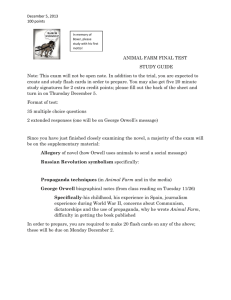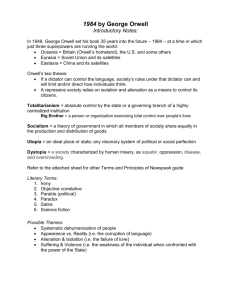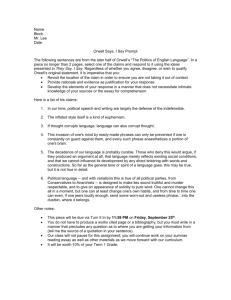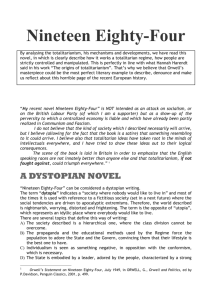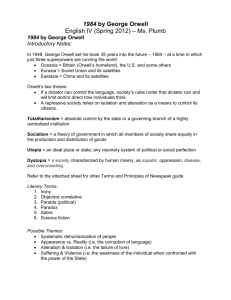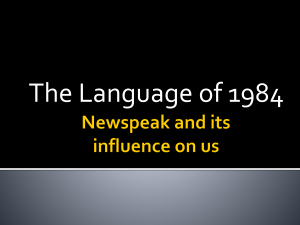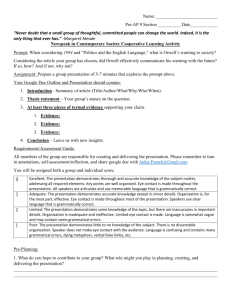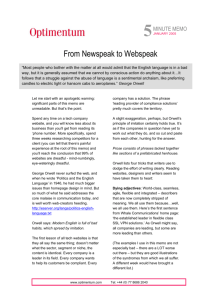Orwell on Language & Politics
advertisement
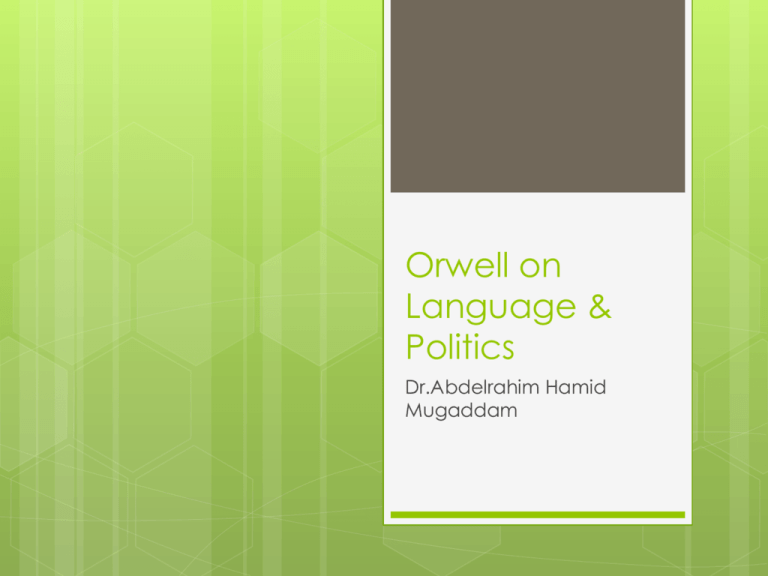
Orwell on Language & Politics Dr.Abdelrahim Hamid Mugaddam Eric Arthur Blair (25 June 1903 – 21 January 1950),[1] better known by his pen name George Orwell, was an English novelist and journalist. His work is marked by clarity, intelligence and wit, awareness of social injustice, opposition to totalitarianism, and belief in democratic socialism.[2][3] Orwell Photo Considered perhaps the 20th century's best chronicler of English culture, Orwell wrote literary criticism, poetry, fiction and polemical journalism. He is best known for the dystopian novel Nineteen Eighty-Four (1949) and the allegorical novella Animal Farm (1945), which together have sold more copies than any two books by any other 20th-century author. His book Homage to Catalonia (1938), an account of his experiences in the Spanish Civil War, is widely acclaimed, as are his numerous essays on politics, literature, language and culture. In 2008, The Times ranked him second on a list of "The 50 greatest British writers since 1945". "Orwellian" describes the situation, idea, or societal condition that George Orwell identified as being destructive to the welfare of a free society. It connotes an attitude and a policy of control by propaganda, surveillance, misinformation, denial of truth, and manipulation of the past, including the "unperson" — a person whose past existence is expunged from the public record and memory, practiced by modern repressive governments. Often, this includes the circumstances depicted in his novels, particularly Nineteen Eighty-Four. Orwell's ideas about personal freedom and state authority developed when he was a British colonial administrator in Burma. He was fascinated by the effect of colonialism on the individual, requiring acceptance of the idea that the colonialist oppressor exists only for the good of the oppressed person and people. Orwell was a member of the Workers' Party of Marxist Unification (POUM) militia and suffered suppression and escaped arrest by the Comintern faction working within the Republican Government. Following his escape he made a strong case for defending the Spanish revolution from the Communists there, and the misinformation in the press at home. During this period he formed strong ideas about the reportage of events, and their context in his own ideas of imperialism and democracy. Meaning The adjective Orwellian refers to these behaviours of The Party, especially when the Party is the State: Invasion of personal privacy, either directly physically or indirectly by surveillance. State control of its citizens' daily life, as in a "Big Brother" society. Official encouragement of policies contributing to the socio-economic disintegration of the family. The adoration of state leaders and their Party. The encouragement of "doublethink", whereby the population must learn to embrace inconsistent concepts without dissent, e.g. giving up liberty for freedom. Similar terms used, are "doublespeak", and "newspeak". The revision of history in the favour of the State's interpretation of it. A (generally) dystopian future. The use of euphemism to describe an agency, program or other concept, especially when the name denotes the opposite of what is actually occurring. E.g. a department that wages war is called the "Ministry of Peace" or "Ministry of Defence". Big Brother The most common sense of Orwellian is that of the allcontrolling "Big Brother" state, used to negatively describe a situation in which a Big Brother authority figure — in concert with "thought police" — constantly monitors the population to detect betrayal via "improper" thoughts. Orwellian also describes oppressive political ideas and the use of euphemistic political language in public discourse to camouflage morally outrageous ideas and actions. In this latter sense, the term is often used as a means of attacking an opponent in political debate, by branding his or her policies as Orwellian. When used like this in political rhetoric if it is not sincere, it is interesting to note as it can be a case of a hypocritical Orwellian strategist denouncing Orwellian strategies. Political Language Orwell tried to promote the use of more precise language in political discourse, and he criticised political language popular at the time, such as "running-dog lackey" and "Fascist octopus", which he said prevented thought. It seems unlikely that Orwell would have approved of many of the uses to which his pseudonym is applied. The loose definition of the term and the often poor correlation between the real-life situations people describe as Orwellian and his own dystopian fiction leave the use of the adjective at best inexact and frequently politically inaccurate. In his essay "Politics and the English Language", Orwell derided the use of cliché and dying metaphors, which "even think your thoughts for you, to a certain extent" and went on to say "But if thought corrupts language, language can also corrupt thought." bad English of his day, citing dying metaphors, pretentious diction or rhetoric, and meaningless words, which he claimed to encourage unclear thought and reasoning. “Isaid earlier that the decadence of our language is probably curable. Those who deny this would argue, if they produced an argument at all, that language merely reflects existing social conditions, and that we cannot influence its development by any direct tinkering with words or constructions”. Rules to Improve English! (i) Never use a metaphor, simile, or other figure of speech which you are used to seeing in print. (ii) Never use a long word where a short one will do. (iii) If it is possible to cut a word out, always cut it out. (iv) Never use the passive where you can use the active. (v) Never use a foreign phrase, a scientific word, or a jargon word if you can think of an everyday English equivalent. (vi) Break any of these rules sooner than say anything outright barbarous. Language Manipulation.. The Newspeak Newspeak is a fictional language in George Orwell's novel Nineteen Eighty-Four. In the novel, it refers to the deliberately impoverished language promoted by the state. Orwell explained the basic principles of the language in an essay included as an appendix to the novel. Newspeak is closely based on English but has a greatly reduced and simplified vocabulary and grammar. The totalitarian aim of the Party is to prevent any alternative thinking — "thoughtcrime", or "crimethink" in the newest edition of Newspeak — by destroying any vocabulary that expresses such concepts as freedom, free enquiry, individualism, resistance to the authority of the state and so on. One character, Syme, says admiringly of the diminishing scope of the new language: "It's a beautiful thing, the destruction of words." Features of the Newspeak The aim of Newspeak is to remove all shades of meaning from language, leaving simple concepts (pleasure and pain, happiness and sadness, goodthink and crimethink) that reinforce the total dominance of the State. Newspeak root words serve as both nouns and verbs, further reducing the total number of words; for example, "think" is both noun and verb, so the word thought is not required and can be abolished. The party also intends that Newspeak be spoken in staccato rhythms with syllables that are easy to pronounce. This will make speech more automatic and unconscious and reduce the likelihood of thought. (See duckspeak.) words with negative meanings are removed as redundant, so "bad" becomes "ungood". Words with comparative and superlative meanings are also simplified, so "better" becomes "gooder", and "best" becomes "goodest". Intensifiers can be added, so "great" became "plusgood", and "excellent" and "splendid" become "doubleplusgood". Adjectives are formed by adding the suffix "-ful" to a root word (e.g., "goodthinkful", orthodox in thought), and adverbs by adding "-wise" ("goodthinkwise", in an orthodox manner). This would, of course, not prevent heretic statements such as "Big Brother is ungood", but not only would this statement sound absurd in the ears of the politically orthodox, it would also be impossible to understand exactly what the statement means, since all concepts and words that can be used to argue against Big Brother would be eradicated from the language. By 2050—earlier, probably—all real knowledge of Oldspeak will have disappeared. The whole literature of the past will have been destroyed. Chaucer, Shakespeare, Milton, Byron—they'll exist only in Newspeak versions, not merely changed into something different, but actually contradictory of what they used to be. Even the literature of the Party will change. Even the slogans will change. How could you have a slogan like "freedom is slavery" when the concept of freedom has been abolished? The whole climate of thought will be different. In fact there will be no thought, as we understand it now. Orthodoxy means not thinking—not needing to think. Orthodoxy is unconsciousness. Some examples of Newspeak from the novel include crimethink, doublethink, and Ingsoc. They mean, respectively, "thought-crime", "accepting as correct two mutually contradictory beliefs", and "English socialism" (the official political philosophy of the Party). The word Newspeak itself also comes from the language. All of these words would be obsolete and have been from the "final" version of Newspeak, except for doubleplusungood in certain contexts. Generically, Newspeak has come to mean any attempt to restrict disapproved language by a government or other powerful entity. Vocabulary The "A" group of words deals with simple concepts needed in everyday life (such as eating, drinking, working, cooking, and the like). It is almost entirely made up of words that already exist in the English language. The "B" group of words is deliberately constructed to convey more complicated ideas. The words in this group are compound words with political implications, and aim to impose the mental attitude of the Party upon the speaker. For example, the Newspeak word "goodthink" roughly means "orthodoxy". The "C" group of words deals with technical vocabulary and is supplementary to the other two groups. Since the Party does not want its people to have knowledge of more than one restricted subject, there is no Newspeak word for "science" as a whole. There are separate words for different fields. In many of his essays and letters Orwell criticised words with formally precise definitions being used badly and the vague slide in meaning for many of these words. He was a fierce critic of Fascism but he would freely mock the promiscuous use of the word: It would seem that, as used, the word 'Fascism' is almost entirely meaningless. In conversation, of course, it is used even more wildly than in print. I have heard it applied to farmers, shopkeepers, Social Credit, corporal punishment, fox-hunting, bull-fighting, the 1922 Committee, the 1941 Committee, Kipling, Gandhi, Chiang Kai-Shek, homosexuality, Priestley's broadcasts, youth hostels, astrology, women, dogs and I don't know what else.[2] Political propaganda! A 1950s Chinese propaganda poster showing a happy family of five enjoying life under the image of Mao Zedong. The caption above the picture reads "The happy life Chairman Mao gives us". A cult of personality A cult of personality arises when an individual uses mass media, propaganda, or other methods, to create an idealized and heroic public image, often through unquestioning flattery and praise. Sociologist Max Weber developed a tripartite classification of authority; the cult of personality holds parallels with what Weber defined as "charismatic authority". A cult of personality is similar to hero worship, except that it is established by mass media and propaganda. Throughout history, monarchs and heads of state were almost always held in enormous reverence. Through the principle of the divine right of kings, for example, rulers were said to hold office by the will of God. Imperial China (see Mandate of Heaven), ancient Egypt, Japan, the Inca, the Aztecs, Tibet, Thailand, and the Roman Empire (see imperial cult) are especially noted for redefining monarchs as god-kings. Personality cults were first described in relation to totalitarian regimes that sought to radically alter or transform society according to radical ideas. Often, a single leader became associated with this revolutionary transformation, and came to be treated as a benevolent "guide" for the nation without whom the transformation to a better future couldn't occur. This has been generally the justification for personality cults that arose in totalitarian societies of the 20th century, such as those of Adolf Hitler and Ruhollah Khomeini. Not all dictatorships foster personality cults, not all personality cults are dictatorships (some are nominally democratic), and some leaders may actively seek to minimize their own public adulation. For example, during the Cambodian Khmer Rouge regime, images of dictator Pol Pot (Saloth Sar) were rarely seen in public, and his identity was under dispute abroad until after his fall from power. The same applied to numerous Eastern European Communist regimes following World War II (although not those of Enver Hoxha and Nicolae Ceaușescu, mentioned below).
